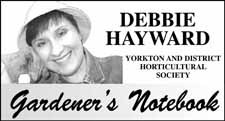Just a reminder, gardeners, the first meeting of the Yorkton and District Horticultural Society will be held on Thursday, September 19 at 7:00 p.m. in the Sunshine Room at SIGN on North Street. Special guest speakers will be Joan Wilson and Paula Maier, talking to us about native plants. I'm sure it will be an informative and interesting meeting, and a great way to kick off the year! We hope you can be there!
And remember that our Fall Plant and Bulb Sale is on Friday, September 20 at the Parkland Mall. This is a one day sale, with lots of great plants at great prices. It's early enough that you can plant new additions into your garden and they will be nicely settled in before winter comes. That's Friday, September 20.
I'd also like to remind you to stop in at City Hall before September 13. The Yorkton and District Horticultural Society will have a photo display in the lobby of City Hall, with pictures of the amazing City planters and flowerbeds. Weren't they simply outstanding this year? Great inspiration for all of us! So if you're downtown, pop in to City Hall this week and take a look at the pictures. It's interesting to think that on September 7, 1906, the horticultural society in Yorkton held their first flower display at City Hall! So it's very nice to be able to mark that occasion, 107 years later, by recognizing the City's horticultural contributions to the city.
When is a citron not a citron? When it's a citron! Does that sound like a riddle? Well, when you think "citron", don't think of the citrus fruit or the little foreign car: think of "citron", the unique fruit that is called the citron melon, and is likely the great- great-many-times granddaddy of the watermelon. The citron has an exotic origin, calling Africa its home, but it also was grown in Egypt thousands of years ago. The official name of the citron is citrullus lanatus. If you are reading up about it in your gardening books, it might also be called tsamma.
A dear friend of ours grows citron, and this year I volunteered to make citron preserves for him. When he came over to our house with the citron, I thought he was carrying a round watermelon: that's the best way I can describe the appearance of a citron to you. The inside is seedier and denser than a watermelon. The citron plant could easily be mistaken for a watermelon plant, with the same growing habit and shape of leaves. It likes much the same growing conditions as well: full sun, heat, and well-drained soil.
When I started looking through my Sweet Pea's recipes, I couldn't find one for citron preserves. Her well-thumbed cookbooks had no recipe for citron preserves, either. But I did find one eventually, and from what I read about it, the citron is not really a fruit that you would just pick off the garden and eat. Rather, its main value seems to be its use in other things, such as in preserves or using it in fruitcake.
Glancing through our seed catalogues, I discovered that citron is not that readily available. I think we can safely say that this would be an heirloom type of fruit, and if you are an adventurous gardener or appreciate the idea of growing heirloom plants, then give citron a try! Heritage Harvest Seed in Carman Manitoba was one outlet for red-seeded citron, and they described it like this:
"it is not eaten raw but is used to make a very clear, transparent preserve of peculiarly fine flavor." There are probably other sources to buy citron seed, but if you are interested, the address is: Heritage Harvest Seed, P.O. Box 40, RR#3, Carman, Manitoba, R0G 0J0. Their phone number is (204) 745-6489. You could also check with Warren Crossman, I think they have many heritage seeds as well.
I'll let you know how the preserves turn out! Have a great week, gardeners!




